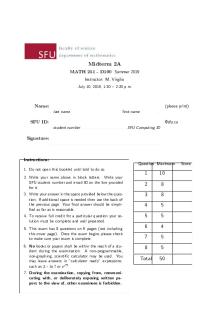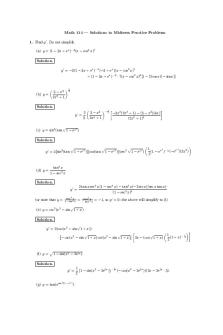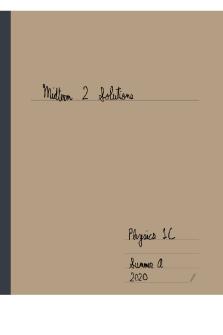CSC 209 2019 Midterm Solutions PDF

| Title | CSC 209 2019 Midterm Solutions |
|---|---|
| Course | Software Tools and Systems Programming |
| Institution | University of Toronto |
| Pages | 9 |
| File Size | 78.3 KB |
| File Type | |
| Total Downloads | 10 |
| Total Views | 130 |
Summary
Midterm Solutions...
Description
CSC 209H5 S 2019 Midterm Test Solutions & Marking Scheme
CSC 209H5 S 2019
Question 1.
[7 marks]
Part (a) [3 marks] Below is a sample script of your terminal: dovahkiin@dh2020pc02:~/209_repo$ git status On branch master Your branch is up to date with ’origin/master’. Changes not staged for commit: (use "git add ..." to update what will be committed) (use "git checkout -- ..." to discard changes in working directory) modified: modified:
t05/bitmap.c t05/bitmap_printer.c
Untracked files: (use "git add ..." to include in what will be committed) t05/nirnroot.bmp no changes added to commit (use "git add" and/or "git commit -a") dovahkiin@dh2020pc02:~/209_repo$ cd a2 dovahkiin@dh2020pc02:~/209_repo/a2$ Write the commands that you would type (after typing the commands shown above) to commit your changes to all your .c files in your t05 directory and update your remote repository on MarkUs, without adding any additional files to your repository. For full marks: • You should not change directories. • Your command(s) should be as short as possible, by taking advantage of globbing and relative file paths.
$ git add ../t05/*.c $ git commit -m "Bla" $ git push
+1 moving to parent directory. +1 globbing. +1 git add, commit, and push. Page 2 of 9
CSC 209H5 S 2019
Part (b) [2 marks] You have written and compiled a program called en2fr, which takes a single command-line argument: the name of an input file containing English-language text. Your program translates the text into French and outputs the translated text to stdout. The UNIX utility wc, when used with no command-line arguments, reads input from stdin and prints out the newline, word, and byte counts to stdout. The -w argument can be used to print only the word count. Write a single-line command that reads the English-language file test.txt and outputs the word count after it has been translated to French. For now, don’t worry about saving the translated text into a file. Assume that both the test.txt file and the en2fr executable file are located in your current directory. $ ./en2fr test.txt | wc -w
+1 Using the pipe properly. +1 Having the entire command correct. Part (c) [2 marks] The problem with the command we asked you to write above is that the French-translated text doesn’t actually get saved into a file—it is simply “consumed” by the wc command. It would be nicer if we could save our translated text into a file and get the word count, all in a single-line command. Thankfully, the UNIX utility tee will help us do just that. When used as follows, tee reads from stdin and copies the stream to stdout and to the file OUTPUT: tee OUTPUT Improve your previous one-line command so that it reads the English-language file test.txt, saves the translated text to test_fr.txt, and outputs the word count of the French translation. $ ./en2fr test.txt | tee test_fr.txt | wc -w
+1 Using two pipes, three commands. +1 Having correct commands in correct order.
Page 3 of 9
CSC 209H5 S 2019
Question 2.
[6 marks]
D´ ej` a vu? Consider the following program: #define ARRAY_SIZE 10 #define TERMINATOR -1 #include #include // Returns the number of integers currently stored in our "array list" of integers, // excluding the TERMINATOR element that signifies the end of the list. int array_len(int *a) { int i; for(i = 0; i < ARRAY_SIZE && a[i] != TERMINATOR; i++); return i; } void jumbleArrays(int* a1, int* a2) { int a1_len = array_len(a1); a2 = a1; // There should be an if statement here in case the list is already full, // before adding 42 to the list, but this does not affect the answer. a2[a1_len] = 42; if(a1_len name); free(curr); return; } // (3) StudentNode *prev = curr; curr = curr->next; for(int i = 1; i < n; i++) { if(curr == NULL) return; prev = curr; curr = curr->next; } // Fix broken link prev->next = curr->next; free(curr->name); free(curr); } Recursive solution is also acceptable. Page 8 of 9
CSC 209H5 S 2019
+1 Returning if head is NULL. +1 Correctly re-assigns the head pointer when n=0. +1 Correctly returns from the function when n is greater than the size of the list. +2 Correctly doing the walk, with the next/prev pointer. +1 Frees the name inside the node before the StudentNode struct itself. +1 Correctly fixes the dangling pointer. Part (b) [2 marks] Consider the code below, which uses the same StudentNode struct as the first part of this question. void updateStudent(struct StudentNode s) { s.num = s.num + 1; strcat(s.name, " v2"); // Using unsafe function for simplicity; don’t try this at home! } int main() { struct StudentNode s1; s1.num = 12345; s1.name = malloc(256*sizeof(char)); strcpy(s1.name, "Bob"); updateStudent(s1); printf("Student name: %s\n", s1.name); printf("Student number: %d\n", s1.num); } Print the exact output of the main function below. Student name: Bob v2 Student number: 12345
+1 Prints correct student name. +1 Prints correct student number.
Page 9 of 9...
Similar Free PDFs

CSC 209 2019 Midterm Solutions
- 9 Pages

2019 Midterm Exam (solutions)
- 6 Pages

Summer 2019 Midterm 2 Solutions
- 11 Pages

Midterm 2019
- 9 Pages

Midterm Exam 2019, questions
- 5 Pages

2020W2 midterm solutions
- 10 Pages

Midterm 2-solutions
- 7 Pages

Patho midterm 2019
- 8 Pages

Midterm 2019, questions
- 9 Pages

Midterm December 2019, answers
- 1 Pages

Midterm Practice 1 Solutions
- 9 Pages

Practice Midterm 2 - Solutions
- 5 Pages

Midterm sp19 solutions
- 7 Pages

Midterm 1 A solutions
- 10 Pages

P1C Midterm 2 Solutions
- 12 Pages
Popular Institutions
- Tinajero National High School - Annex
- Politeknik Caltex Riau
- Yokohama City University
- SGT University
- University of Al-Qadisiyah
- Divine Word College of Vigan
- Techniek College Rotterdam
- Universidade de Santiago
- Universiti Teknologi MARA Cawangan Johor Kampus Pasir Gudang
- Poltekkes Kemenkes Yogyakarta
- Baguio City National High School
- Colegio san marcos
- preparatoria uno
- Centro de Bachillerato Tecnológico Industrial y de Servicios No. 107
- Dalian Maritime University
- Quang Trung Secondary School
- Colegio Tecnológico en Informática
- Corporación Regional de Educación Superior
- Grupo CEDVA
- Dar Al Uloom University
- Centro de Estudios Preuniversitarios de la Universidad Nacional de Ingeniería
- 上智大学
- Aakash International School, Nuna Majara
- San Felipe Neri Catholic School
- Kang Chiao International School - New Taipei City
- Misamis Occidental National High School
- Institución Educativa Escuela Normal Juan Ladrilleros
- Kolehiyo ng Pantukan
- Batanes State College
- Instituto Continental
- Sekolah Menengah Kejuruan Kesehatan Kaltara (Tarakan)
- Colegio de La Inmaculada Concepcion - Cebu
